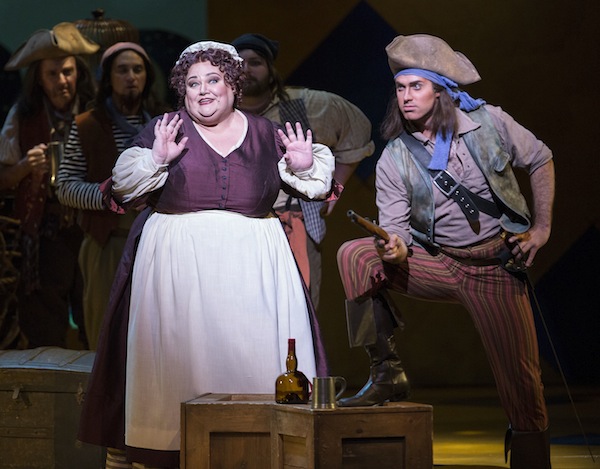Palm Beach Opera closes season with a delightful “Pirates of Penzance”

Stephanie Blythe as Ruth and Tobias Greenhalgh as Samuel in Gilbert & Sullivan’s “The Pirates of Penzance” at Palm Beach Opera. Photo: Bruce Bennett
“Welcome to the opera where nobody dies at the end,” was Palm Beach Opera general director Daniel Biaggi’s greeting to the audience at Friday night’s opening performance of The Pirates of Penzance at the Kravis Center.
Indeed the operettas of W.S. Gilbert and Sir Arthur Sullivan are high-spirited confections that satirize both the conventions of grand opera and the mores of Victorian society. While the melodramatic clichés of death, exile and unrequited love are frequently present, Gilbert’s librettos always find a resolution that leaves his characters happy and the audience smiling (with the exception of the tragic ending of The Yeoman of the Guard). Sullivan was a master of melody and sparkling orchestration and a strong production of the duo’s work is nearly guaranteed to chase the blues away.
Pirates of Penzance is one of their best collaborations and, in most respects, the PBO staging is musically and theatrically first rate. Although G & S were sending up operatic pomposity, their scores require the kind of voices that would be at home in the works of Mozart or Rossini and the Palm Beach production was replete with top-notch singing.
In a star turn as the nursemaid Ruth, Stephanie Blythe gives a larger-than-life performance. At home in repertoire that ranges from Handel to Wagner and Mahler, Blythe’s large, rich mezzo gleams through Sullivan’s mock-dramatic ditties and quasi-parlor songs. With rock-solid low tones and the ability to send up grand opera with the aplomb of a Carol Burnett, Blythe was simply terrific in a role usually reserved for light-voiced character singers.
Although he was not the type of British music hall vaudevillian (of the Martyn Green variety) that the role of Major General Stanley was envisioned for, Hugh Russell brought a robust Broadway baritone and the ability to toss off fast-paced patter with agility and showbiz flair.
Andrew Stenson’s dulcet tenor as Frederic and Sarah Joy Miller’s attractive soprano as Mabel made an entrancing pair of lovers, their timbres beautifully matched in duets. Miller’s spot on coloratura high-jinks in “Poor Wandering One” were an utter delight.
Michael Todd Simpson had the burly baritone and rough-hewn demeanor for the Pirate King. Tobias Greenhalgh was a born scene-stealer as his lieutenant. As the Sergeant of Police, Mark Schnaible descended to the deepest bass notes with ease and led his force through Keystone Cops antics in “A Policeman’s Lot is Not a Happy One.” When Ruth announces that the pirates are all noblemen and members of the House of Lords gone wrong, you could almost believe it, so comically inept were these police.
Danielle MacMillan, Tara Curtis and Kasia Borowiec exhibited fine voices and charming stage presence as Mabel’s sisters.
David Stern’s deftly paced reading of the overture and snappy conducting kept the show moving (at least as could be ascertained from the dull pit sound as heard near the back of the house). Under chorus director Greg Ritchey, the male and female choruses were vociferous. In the midst of the hurly-burly Act I finale, the a capella ensemble “Hail Poetry” was exquisitely sung against a red lit set. Here Sullivan displays his serious credentials as a composer with the skill of a Mendelssohn.
The spoken dialogue was largely inaudible at the back of the hall, except for Blythe and Simpson who taught a lesson in theater projection. The projected surtitles only covered the sung portions with the spoken lines unscreened. This was a major miscalculation that likely left many audience members new to the operetta in the dark regarding the plot.
James Schuette’s picture-book sets and Sona Amroyan’s colorful array of over-the-top costumes were the perfect backdrop for director Alan Paul’s zany staging. Deana Dys’ fast-paced choreography put the singers through their paces and most could really dance.
There was not a dull moment in this high-gloss production. The women’s chorus with their parasols gliding through the air and the Act I finale that brought on both a giant Union Jack and pirate flag as lights flashed all around the extra proscenium in front of the curtain were just two of the delightful moments in a staging filled with splashy visuals.
Despite the major issue of the under-projected dialogue, Palm Beach Opera’s Pirates of Penzance is great entertainment, a lively reinvention of a classic filled with joy and wit.
Palm Beach Opera repeats The Pirates of Penzance 7:30 p.m. Saturday and 2 p.m. Sunday at the Kravis Center in West Palm Beach. pbopera.org
Palm Beach Opera’s 2018 season opens with Puccini’s Tosca (January 26-28) followed by Leonard Bernstein’s Candide (February 23-25) and Mozart’s Marriage of Figaro (March 23-25).
Posted in Performances
Leave a Comment
Sat Apr 8, 2017
at 12:23 pm
No Comments